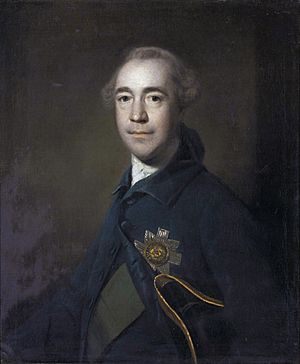Charles Colyear, 2nd Earl of Portmore facts for kids
Quick facts for kids
The Earl of Portmore
|
|
|---|---|

Portrait of Lord Portmore, by Joshua Reynolds, 1758
|
|
| Member of Parliament for Andover | |
| In office 1727–1730 Serving with James Brudenell
|
|
| Preceded by | William Guidott James Brudenell |
| Succeeded by | James Brudenell William Guidott |
| Member of Parliament for Wycombe | |
| In office 1726–1726 Serving with The Lord Shelburne
|
|
| Preceded by | Charles Egerton The Lord Shelburne |
| Succeeded by | The Lord Shelburne Harry Waller |
| Personal details | |
| Born |
Charles Colyear
27 August 1700 |
| Died | 5 July 1785 (aged 84) |
| Spouses |
Juliana Osborne, Duchess of Leeds
(m. 1732) |
| Parents | David Colyear, 1st Earl of Portmore Catherine Sedley, Countess of Dorchester |
Charles Colyear, the 2nd Earl of Portmore (born August 27, 1700 – died July 5, 1785), was an important British politician. He was also known as Lord Milsington before he became an Earl. People called him Beau Colyear because he loved to wear fancy clothes. He was also famous for owning racehorses. He served in the House of Commons and later in the House of Lords.
Early Life and Family
Charles Colyear was born on August 27, 1700. His father was David Colyear, 1st Earl of Portmore. His mother was Catherine Sedley, Countess of Dorchester. She was the daughter of Sir Charles Sedley, 5th Baronet. Charles's mother owned Portmore House in Weybridge, Surrey. This house later became the family home for the Earls of Portmore. When he was 19, in 1719, Charles worked as a page for the Princess of Wales.
His Political Career
Charles Colyear started his political journey as Lord Milsington. He became a Member of Parliament (MP) for Wycombe in 1726. An MP is a person elected to represent a group of people in the House of Commons. However, his election was cancelled because of issues with the voting process. He was elected again, but then lost his seat after a challenge.
In 1727, he was successfully elected as an MP for Andover. He voted with the government on important financial matters.
In 1730, his father passed away. Charles then became the 2nd Earl of Portmore. This meant he left the House of Commons. Instead, he became a peer, which is a member of the nobility. He then joined the House of Lords. In 1732, he was sent to represent Britain in Italy. He also received a special honor, becoming a Knight of the Order of the Thistle. From 1734 to 1737, he served as a Scottish representative peer in the House of Lords. This meant he was chosen by other Scottish nobles to speak for them.
Life in High Society
Lord Portmore was well-known in high society. He was famous for his amazing clothes and fancy carriages. This is why he earned the nickname 'Beau Colyear'. He was also a big fan of horse racing. He owned several famous racehorses, including one named Crab and another called Squirt.
He also cared about helping others. In 1739, he became one of the first Governors of the Foundling Hospital. This was a charity that helped children who had been abandoned.
Family Life
On October 7, 1732, Lord Portmore married Juliana Osborne, Duchess of Leeds. She was the daughter of Roger Hele. Juliana had been married before to the 3rd Duke of Leeds.
Together, Charles and Juliana had four children:
- Caroline Colyear (born around 1733 – died 1812). She married Nathaniel Curzon, 1st Baron Scarsdale.
- Juliana Colyear (born 1735 – died 1821). She married Henry Dawkins in 1759.
- David Colyear, Viscount Milsington (born 1736 – died 1756). He never married.
- William Charles Colyear, 3rd Earl of Portmore (born 1745 – died 1823). He married Lady Mary Leslie.
Lord Portmore also had a daughter named Elizabeth Collier (born 1747 – died 1832). She later married Colonel Edward Pole. After he passed away, she married Dr. Erasmus Darwin. He was the grandfather of the famous scientist Charles Darwin.
Lord Portmore passed away on July 5, 1785. His wife, Juliana, died nine years later in 1794.
Arms
|
 | Tommie Smith |
 | Simone Manuel |
 | Shani Davis |
 | Simone Biles |
 | Alice Coachman |

